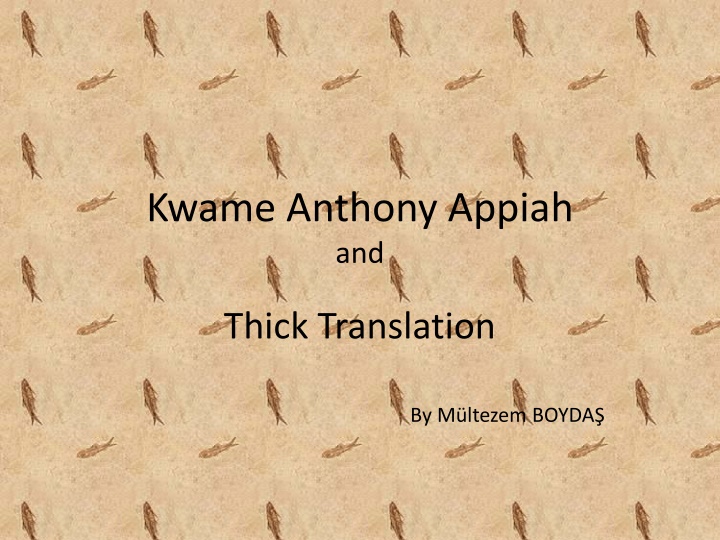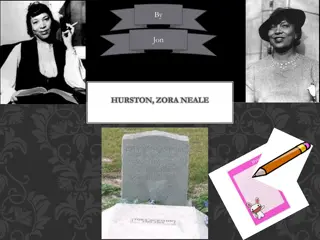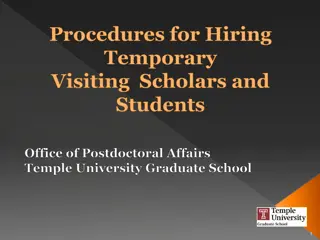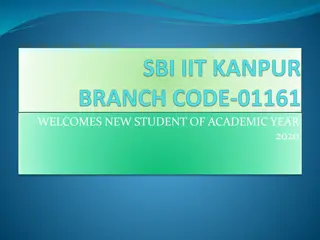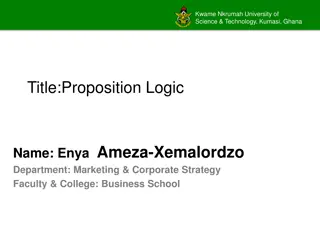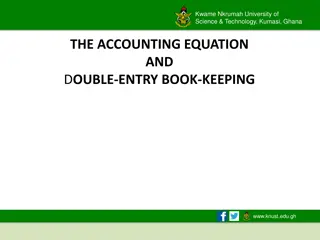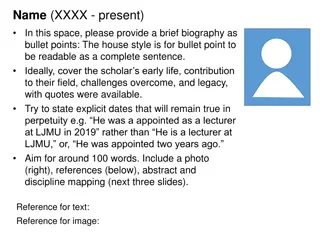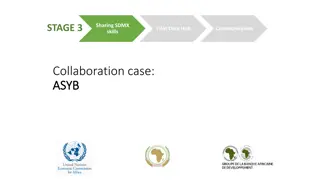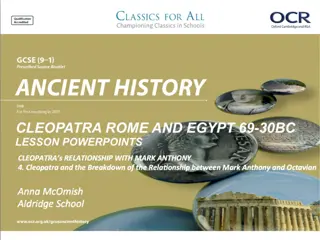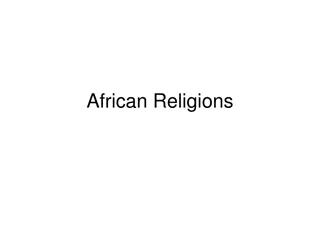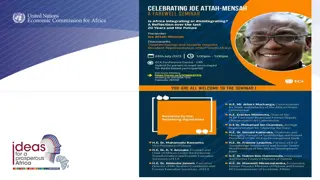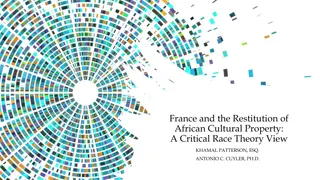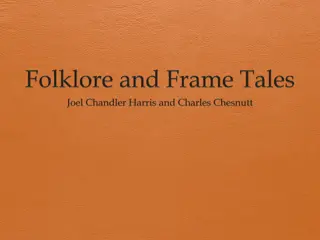Kwame Anthony Appiah: Scholar of African Studies
Kwame Anthony Appiah, a prominent scholar in African and African-American studies and translation, has delved into the complexities of cultural interpretation and literary translation, advocating for a detailed approach called "Thick Translation."
Download Presentation

Please find below an Image/Link to download the presentation.
The content on the website is provided AS IS for your information and personal use only. It may not be sold, licensed, or shared on other websites without obtaining consent from the author.If you encounter any issues during the download, it is possible that the publisher has removed the file from their server.
You are allowed to download the files provided on this website for personal or commercial use, subject to the condition that they are used lawfully. All files are the property of their respective owners.
The content on the website is provided AS IS for your information and personal use only. It may not be sold, licensed, or shared on other websites without obtaining consent from the author.
E N D
Presentation Transcript
Kwame Anthony Appiah and Thick Translation By M ltezem BOYDA
Kwame Anthony Appiah Kwame Anthony Akroma-Ampim Kusi Appiah was born in London on may 8 1954. His father, Joseph Emmanuel Appiah, was a lawyer and politician. His mother, Peggy Appiah a novelist , was active in the social, life of Kumasi. Dame Isobel Cripps, widow of the English statesman Sir Stafford Cripps who involved in negotiating the terms for Indian independence from British rule
Kwame Anthony Appiah Professor Appiah took both his B.A. and Ph.D. degrees in the philosophy department at Clare College, Cambridge University, in England. From 2002 to 2013 he was a member of the Princeton University faculty. He was associated with the programs in African Studies and Translation Studies, and the Departments of Comparative Literature and Politics. In January 2014 he became a Professor of Philosophy and Law at New York University, where he teaches both in New York and in Abu Dhabi and at other NYU global centers.
Kwame Anthony Appiah In My Father s House explored the role of African and African-American intellectuals in shaping contemporary African cultural life. Won the Anisfield-Wolf Book Award and the Herskovitz Award of the African Studies Association for the most important scholarly work in African studies published in English. His scholarly interests range over African and African- American intellectual history and literary studies, ethics and philosophy of mind and language. He also worked on theories of translation since he was associated with translation studies in Princeton University.
THICK TRANSLATION Translation is a tool for didactic and intercultural interaction purposes. "Thick Translation" is the adaptation of the term "thick description" brought forward by Clifford Geertz.
THICK TRANSLATION "Geertz assumes that each detail of a person's thoughts and actions are embedded in hugely complex realms of cultural meaning: each detail is worth studying and each detail is important in order to understand the other details and the contextual whole. If such complexity is difficult to interpret, it is also difficult to convey in the linear and skimpy medium of the written word. Appiah's "Thick Translation" is a response to this difficulty...He calls for literary translation to address head-on the extreme compaction of meaning in literary and cultural texts, by using extensive annotations and glosses to locate the text in a rich cultural and lingustic context." (Sturge, 80)
THICK TRANSLATION "Asem a ehia Akanfo no na Ntafo de goro brekete. [A matter which troubles the Akan people, the people of Gonja take to play the brekete drum.] Kaka ne eka ne ayafunka fanyinam eka. [Toothache and indebtedness and stomach ache, debt is preferable.] Kamesek wakye se: se nim se abe rebebere a, anka wank ware ad be nkonto. [The drongo says: if he had known that the palm nuts were going to ripen, then he would not have married the raffia palm with a twisted leg.] Appiah, 417
THICK TRANSLATION "Utterences - ordinary everday remarks - are in this respect somewhat unusual for while it may not be easy to give a full account of why someone has, for example, uttered the words " it's a lovely, sunny day" in the ordinary course of things English speakers will be inclined to suppose that anyone who says this to them has, as one reason for uttering, the intentions to express the thought that it is a lovely day, sunny day." (Appiah, 418)
THICK TRANSLATION (GM) (i) By x-ing U intends A to believe that p. (ii) A recognizes that (i). (iii) A believes because of (ii) that if (i) then p. (iv) Therefore: A believes that p. Petrus, 17
THICK TRANSLATION "it is the act that achives its purpose because its purpose is recognized."(Appiah, 419) "John is in the kitchen or the den." He is not actually sure if john is in the kitchen or in the den.
THICK TRANSLATION "On this topic I am only saying where I stand, not making arguements: If I am right, there are barriers to translation to be noted here, but, as I say, while they are important to an understanding of why translations is so difficult, they do not seem theoretically puzzling. If you cannot conventionally communicate a certain literal intention in language A and you can in language B, then the translator cannot produce a literal translation; that is all it amounts to." Appiah, 421
THICK TRANSLATION John Searle s theory of direct and indirect speech-acts. There's an ant on your shoulder" with the primary intention of getting the hearer to recognize by the Gricean Mechanism that the speaker cares about the hearer, an affect which will depend on what the speaker says being taken literally as well and being seen to be true; or "Juliet is the sun" non-literally but in order to communicate indirectly that Juliet is the central fact of the speakers life."
THICK TRANSLATION Gricean Mechanism + Searle's distinction = Thick Translation
THICK TRANSLATION "It may be possible in literal translation, to find a sentence in a target language that has more or less the same literal intentions as the utterence in the object language. If not possible, it may be clear enough why: there is no way of expressing that thought in the target language, perhaps because the referent of some term is unknown there, or because a social practice in which the utterence is embedded - the curse, say - is absent. Success and failure at this level are well enough defined." Appiah, 425
THICK TRANSLATION In a translation a precise set of parallels is likely to be impossible. "We may choose, rightly, to translate a term in a way that is unfaithfull to the literal intentions, because we are trying to preserve formal features that seem most crucial." (Appiah, 425)
THICK TRANSLATION "So that the reason why we cannot speak of the perfect translation here is not that there is a definite set of desiderata and we know they cannot all be met; it is rather that there is no definite set of desiderata. Appiah, 425
THICK TRANSLATION "First, he underlines that the primary point of translation ought to be pedagogic. Second, he makes the aspects and mechanisms of thick translation explicit: it is a mode of translation in which the translator annotates the text to situate the reader in a context and explain phrases that do not make sense." Parker, 9
THICK TRANSLATION "a fine translation of a literary text - which is to say a taught text - is that it should preserve for us the features that make it worth teaching." Appiah, 426 "Such translations can be read as rewardingly as any literary works. Appiah, 427
THICK TRANSLATION DEFINITION "A translation that aims to be of use in literary teaching; and here it seems to me that such academic translation, translation that seeks with its annotations and its accompanying glosses to locate the text in a rich cultural and linguistic context, is eminently worth doing. I called this Thick Translation" Appiah, 427
THICK TRANSLATION CONCLUSION Appiah's "Thick Translation" serves some purposes that himself puts. He is especially broadening the vision and imagination of North Americans beyond the narrow scope of the United States; the desire to develop views of the world elsewhere that respect more deeply the autonomy of the Other (Appiah, 428). purpose is to put an end to sexism and racism commited on African people, by having the two cultures to know each other more closely. He wants to end the cultural inferiority complexes shown by African students. He wants to challenge the cultural superiority "undermining the aestheticized conceptions of value that it presupposes." he concerned with His of the west by
